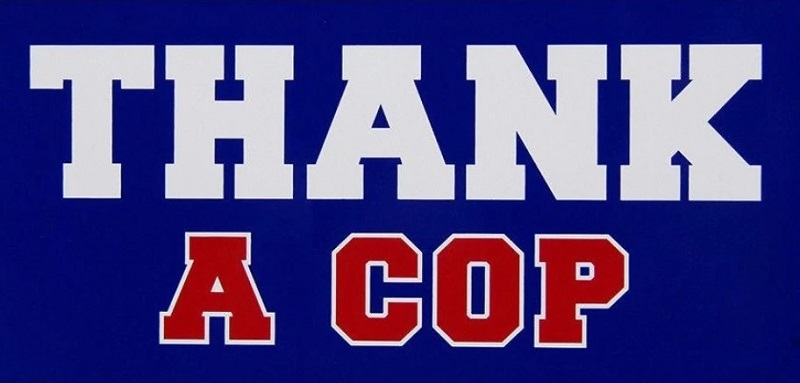
There isn’t a lot of hoopla over Law Enforcement Appreciation Day which was January 9th this year. After all, it competes with National Apricot Day, Balloon Ascension Day, National Static Electricity Day, Word Nerd Day, Take the Stairs Day, and Ride the Subway Naked Day. Besides those special days, January 9th begins a week-long celebration of Elvis’ birthday and National Pizza Week.
Frankly, with Police Week and Law Enforcement Memorial Day, I think we risk wearing even police supporters thin. The real question for the majority of great citizens who do have an appreciation for the necessary work of policing is how to sustainably support and appreciate our law enforcement officers.
One important and often overlooked aspect of showing appreciation is the reality of a police officer’s daily life that inhibits their approachability. Officers are often busy even if they don’t appear to be. An officer in a restaurant might be lunching, or they might be interviewing or waiting for a victim or witness. Trying to talk to an officer is often distracting as they are listening to their radio from their earpiece or shoulder mic. While listening to you they will likely break eye contact to scan the environment for threats and suspicious activity,
If you try to buy their coffee or meal they will likely say thank you but turn down the offer because it is a violation of their department’s ethics policy. If you pay without them knowing it, they may feel they have to leave the price of the meal as a tip.
Approaching an officer in their car will also make police officers nervous. Sadly, many officers have been assaulted and even killed just sitting in their patrol car stopped at a stop sign or in a parking lot working on a report. Offering a hot beverage to an officer standing at some assigned post is a kind gesture, but the officer may not be in a position to hold on to it and attend to their duties. The same goes for offering to pray with an officer. They may be hesitant to lower their head or close their eyes in their habit of constant vigilance and not everyone shares your faith.
Sadly, consumable gifts have to be suspected even when delivered with the purest of hearts. There are just enough evil persons in the world that would adulterate food or beverage to sicken an officer that the wisest course is to accept the gift graciously then throw it away. As in most cultures, Americans love to give cakes and casseroles as compassionate and thoughtful gifts. In addition, anything in a box may be considered a suspicious package.
So what is a good citizen to do? Understanding the realities of life as an officer and not be offended if they can’t give you the thanks and attention that you deserve at the moment. A Card of thanks to them through their agency is appreciated. Especially when an officer is injured or involved in a critical incident, a card to the station will be special.
If you want to speak to an officer, it might be especially courteous to ask if they have a moment or if they are on break. Just saying thank you or promising to pray for them is a quick affirmation that poses no imposition on their time or attention. Even a thumbs up can brighten their day. If you’re sending a gift of food for the shift, it’s best to send something prepackaged or delivered from a restaurant rather than something homemade. If you know an officer and they can carry your homemade item and vouch for its safety, it will be more likely to get eaten and enjoyed.
If you have a concern about your neighborhood, a complaint about an officer’s conduct, or a dissertation on the criminal justice system, making an appointment to speak with an officer or supervisor will be more effective than a spontaneous conversation with an officer waiting for their cheeseburger during a break in her shift.
It is sad that in today’s world that police officers must be prepared for insult or assault when approached by a citizen, but that is their reality and training. With courtesy and caution, you can still brighten an officer’s day.